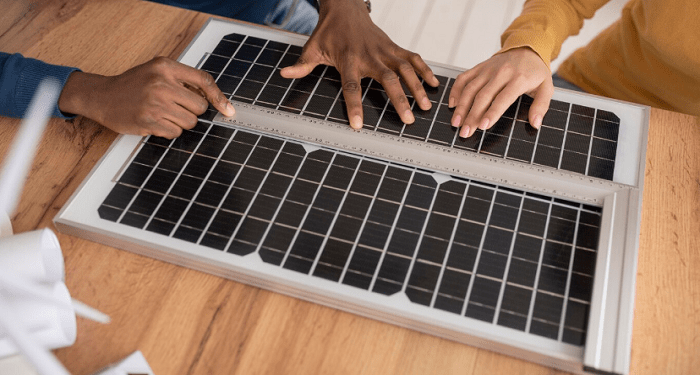Solar panels are a renewable energy source that harnesses the power of the sun to generate electricity. They are becoming increasingly popular as homeowners look for ways to reduce their reliance on traditional energy sources and lower their electricity bills. Solar panels offer numerous benefits, including cost savings, environmental sustainability, and energy independence.
Electricity bills are a monthly expense that can quickly add up, especially during peak usage times. By installing solar panels, homeowners can generate their own electricity and reduce their reliance on the grid. This can lead to significant savings on electricity bills, as well as provide a more sustainable and environmentally friendly energy source.
Understanding the Basics of Solar Energy
Solar energy is generated through the use of photovoltaic (PV) cells, which convert sunlight into electricity. These cells are typically made from silicon, a semiconductor material that absorbs photons from the sun and releases electrons. When sunlight hits the PV cells, it creates an electric field that allows the electrons to flow and generate an electrical current.
There are different types of solar panels available, including monocrystalline, polycrystalline, and thin-film panels. Monocrystalline panels are made from a single crystal structure and are known for their high efficiency. Polycrystalline panels are made from multiple crystal structures and are slightly less efficient but more affordable. Thin-film panels are made by depositing a thin layer of semiconductor material onto a substrate and are the least efficient but also the most affordable option.
How Solar Panels Generate Electricity
Solar panels generate electricity through a process called the photovoltaic effect. When sunlight hits the PV cells, it excites the electrons in the silicon atoms, causing them to break free from their atoms and create an electric current. This current is then captured by the wiring in the solar panel system and sent to an inverter, which converts the direct current (DC) electricity into alternating current (AC) electricity that can be used to power homes and businesses.
A residential solar panel system consists of several components, including the solar panels themselves, an inverter, a mounting system, and a monitoring system. The solar panels are typically mounted on the roof or ground and are connected to the inverter, which converts the DC electricity into AC electricity. The mounting system ensures that the panels are securely attached to the roof or ground, while the monitoring system allows homeowners to track the performance of their solar panel system and monitor their energy production.
The Role of Net Metering in Reducing Your Electricity Bill
Net metering is a billing arrangement that allows homeowners with solar panels to receive credit for any excess electricity they generate and send back to the grid. Under a net metering agreement, homeowners are only billed for their net energy usage, which is the difference between the electricity they consume and the electricity they generate.
When homeowners generate more electricity than they consume, the excess energy is sent back to the grid and credited to their account. This credit can then be used to offset future electricity bills when homeowners consume more electricity than they generate. Net metering is a key incentive for homeowners to install solar panels, as it allows them to reduce their reliance on the grid and potentially eliminate their electricity bills altogether.
Factors Affecting the Efficiency of Solar Panels
Several factors can impact the efficiency of solar panels, including the angle and orientation of the panels, shading, temperature, and dust or dirt buildup. The angle and orientation of the panels play a crucial role in maximizing their exposure to sunlight. Ideally, solar panels should be installed at an angle that allows them to capture the most sunlight throughout the day.
Shading can significantly reduce the efficiency of solar panels by blocking sunlight from reaching the cells. It is important to ensure that there are no obstructions, such as trees or buildings, that cast shadows on the panels. Additionally, temperature can affect the performance of solar panels, as they become less efficient in hot weather. Dust or dirt buildup on the panels can also reduce their efficiency, so regular cleaning is necessary to maintain optimal performance.
To maximize the efficiency of your solar panel system, it is important to regularly monitor its performance and address any issues that may arise. If it’s your Canberra home, a Bassendean restaurant or a factory in Adelaide, the same applies. This can include adjusting the angle or orientation of the panels, trimming trees or vegetation that may be causing shading, and cleaning the panels to remove any dust or dirt buildup.
Estimating the Savings from Solar Panels on Your Electricity Bill
The potential savings from installing solar panels can vary depending on several factors, including the size of the system, the amount of sunlight in your area, and your current electricity usage. To estimate the savings from solar panels on your electricity bill, you will need to consider the cost of installing the system, the amount of electricity it is expected to generate, and the current cost of electricity from your utility provider.
The cost of installing a solar panel system can vary depending on the size and complexity of the installation. However, there are often incentives and rebates available that can help offset some of the upfront costs. The amount of electricity a solar panel system is expected to generate is measured in kilowatt-hours (kWh) and can be estimated based on factors such as the size and efficiency of the panels, as well as the amount of sunlight in your area.
By comparing the estimated electricity generation from your solar panel system to your current electricity usage and the cost of electricity from your utility provider, you can determine how much you are likely to save on your electricity bill. It is important to note that savings will vary depending on individual circumstances and energy usage patterns.
Financing Options for Installing Solar Panels
There are several financing options available for homeowners looking to install solar panels. These options include cash purchases, solar loans, solar leases, and power purchase agreements (PPAs). Each option has its own pros and cons, and it is important to carefully consider your financial situation and goals before making a decision.
A cash purchase involves paying for the solar panel system upfront, which allows homeowners to take advantage of any available incentives and rebates. This option provides the greatest long-term savings, as homeowners can avoid paying interest on a loan or lease. However, it requires a significant upfront investment and may not be feasible for everyone.
Solar loans are another popular financing option that allows homeowners to spread out the cost of the solar panel system over time. These loans typically have lower interest rates than traditional loans and can be paid off over a period of 10 to 20 years. Solar loans provide homeowners with the benefits of ownership, as they own the system and are eligible for any available incentives and rebates.
Solar leases and PPAs are third-party ownership options that allow homeowners to install solar panels without having to pay for the system upfront. With a solar lease, homeowners pay a fixed monthly fee to lease the system from a solar provider. With a PPA, homeowners agree to purchase the electricity generated by the solar panel system at a predetermined rate. Both options allow homeowners to benefit from solar energy without the upfront costs, but they do not provide the same long-term savings as cash purchases or solar loans.
Maintenance and Upkeep of Solar Panels for Optimal Performance
Regular maintenance and upkeep are essential for ensuring the optimal performance of your solar panel system. This includes cleaning the panels to remove any dust or dirt buildup, inspecting the wiring and connections for any damage or wear, and monitoring the performance of the system to identify any issues that may arise.
Cleaning your solar panels is relatively simple and can be done with a soft brush or sponge and some water. It is important to avoid using abrasive materials or harsh chemicals, as they can damage the panels. Regular cleaning will help maximize the efficiency of your solar panel system and ensure that it is generating as much electricity as possible.
In addition to cleaning, it is important to regularly inspect the wiring and connections of your solar panel system. This can help identify any loose or damaged wires that may be affecting the performance of the system. It is also a good idea to monitor the performance of your solar panel system on a regular basis to ensure that it is generating the expected amount of electricity. If you notice any significant changes in performance, it may be necessary to contact a professional for further inspection and maintenance.
Comparing Solar Panels to Traditional Energy Sources
When comparing solar panels to traditional energy sources, there are several factors to consider, including cost, environmental impact, and energy independence. Solar panels offer significant cost savings over time, as they allow homeowners to generate their own electricity and reduce their reliance on the grid. While there is an upfront cost associated with installing solar panels, the long-term savings can be substantial.
In terms of environmental impact, solar energy is a clean and renewable energy source that produces no greenhouse gas emissions or air pollution. Traditional energy sources, such as coal and natural gas, contribute to climate change and air pollution, which can have detrimental effects on human health and the environment. By switching to solar energy, homeowners can reduce their carbon footprint and contribute to a more sustainable future.
Solar panels also offer homeowners greater energy independence, as they are not reliant on the grid for their electricity needs. This can provide peace of mind during power outages or emergencies, as homeowners with solar panels can continue to generate their own electricity and maintain power in their homes. Additionally, solar panels can increase the value of a home and make it more attractive to potential buyers.
The Future of Solar Energy and Its Impact on Electricity Bills
The future of solar energy looks promising, with advancements in technology and increasing affordability making it more accessible to homeowners. As solar panel technology continues to improve, the efficiency and performance of solar panels are expected to increase, leading to even greater cost savings and environmental benefits.
One of the latest advancements in solar technology is the development of solar batteries, which allow homeowners to store excess electricity generated by their solar panel system for use during times when the sun is not shining. This can further reduce reliance on the grid and provide homeowners with greater energy independence. Additionally, advancements in solar panel design and manufacturing are making solar panels more affordable and efficient, making them a viable option for more homeowners.
The impact of solar energy on electricity bills is expected to continue to grow as more homeowners make the switch to solar power. As the cost of traditional energy sources continues to rise, solar energy offers a more affordable and sustainable alternative. With net metering and other incentives in place, homeowners can significantly reduce their electricity bills and potentially eliminate them altogether.
In conclusion, solar panels offer numerous benefits for homeowners, including cost savings, environmental sustainability, and energy independence. By harnessing the power of the sun, solar panels generate electricity that can be used to power homes and businesses. With net metering and other incentives in place, homeowners can reduce their reliance on the grid and potentially eliminate their electricity bills altogether. As technology continues to improve and become more affordable, the future of solar energy looks promising, with even greater cost savings and environmental benefits on the horizon.









